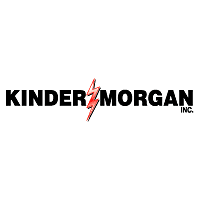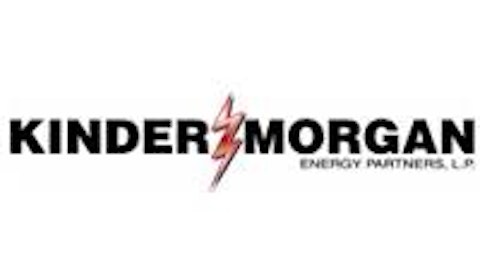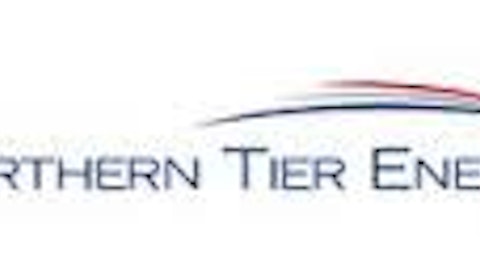Based on combined enterprise value, Kinder Morgan Inc (NYSE:KMI) is the third-largest energy company in North America. We tend to associate the giant with its 75,000 miles of pipelines, but in reality its operations are incredibly diverse. Over the next few days, I’ll take a closer look at each of the midstream company’s five distinct business units. I’ve already tackled the terminals segment and the natural gas pipelines segment, so today we’ll break down the partnership’s products pipelines business.

Kinder Morgan Inc (NYSE:KMI), with its master limited partnership Kinder Morgan Energy Partners LP (NYSE:KMP), operates an 8,000-mile network of refined products pipelines and 50 liquids terminals. It transports 2 million barrels a day, making it the largest independent transporter of refined petroleum products in the U.S.
Products include the usual suspects — gasoline, diesel, and jet fuel — but also natural gas liquids and biofuels. That diversity plays a crucial role come earnings time, and we’ll get to that in a minute. Unlike the partnership’s natural gas pipeline system, which is largely concentrated in Texas, its refined products network is smaller, with assets in California, the northeast, and Canada.
Across the country, demand for refined products such as gasoline has dropped over the past few years. Kinder Morgan Inc (NYSE:KMI) wasn’t immune from the effects of that. Segment volumes dropped 1.5% in 2012, led by a 5% drop in diesel volumes. And yet, fourth-quarter earnings were up year over year because NGL volumes and biofuels volumes both increased by about 22%.
Kinder Morgan Inc (NYSE:KMI) was the first company to transport ethanol via pipeline for commercial use, way back in 2008. It started moving biodiesel in 2009 and never looked back. The segment has been on a tear ever since, and earned $176 million in Q4, a 9% jump over 2011’s earnings.
Kinder Morgan Inc (NYSE:KMI) anticipates growth in the refined products segment in 2013, despite expectations for relatively flat demand for petroleum products:

Source: Company presentation.
The target for the year is to achieve $791 million in earnings, translating to $741 million in distributable cash flow, which would be close to a $90 million increase over last year’s results. At the same time, Kinder Morgan hopes for a minimal increase in sustaining capital expenditures. The partnership spent $47.8 million in 2012 and is looking to keep capex under $50.1 million in 2013.
Let’s take a look at how Kinder Morgan plans to achieve that growth .
A look ahead
A big part of Kinder Morgan Inc (NYSE:KMI)’s growth will come from its biofuels segment. The partnership expects to increase biofuels volumes handled from 34.4 million in 2012 to 41.8 million in 2013. A few recent developments will help that dream come true, beginning with increased biodiesel blending at four locations between California and Arizona. As far as transportation goes, Kinder Morgan has acquired a transload terminal in South Carolina, and has put an ethanol unit train receipt facility on line in Tampa, Fla. The regulatory environment remains strong for biofuels, and the partnership expects revenue to grow to $100 million next year.
The segment will also benefit from a full year of earnings from the Kinder Morgan Inc (NYSE:KMI) Crude & Condensate system, the segment’s lone Texas asset. The line stretches from the Houston Ship Channel into the Eagle Ford. Management expects to benefit from increased production volumes in the Ford, and is currently weighing a $100 million extension deeper into the shale play. Increased volumes will be supplemented by earnings from the Sweeny lateral completion, with a fourth-quarter in-service date. The Sweeny line will connect to a Phillips 66 (NYSE:PSX) refinery with a per-day commitment of 19 million barrels from the refiner.
Though one of this segment’s biggest projects won’t go into effect until 2014, it’s worth noting the Cochin line reversal and diluent conversion. The pipeline that runs from Alberta through Illinois and up into Michigan will be reversed west of Kankakee County, Ill., and begin carrying condensate to Canada’s oil sands by next summer. Bitumen from the oil sands needs to be mixed with diluent to flow through a pipeline. Reversing the Cochin allows Kinder Morgan to take advantage of increased demand for light condensate.
Finally, management has estimated the segment’s sensitivity to volume fluctuation for the year. A 1% change will impact EBITDA by roughly $4 million.
Foolish takeaway
Kinder Morgan’s products pipelines business is an important part of its energy network. The diverse liquids that the company handles, from jet fuel to biofuels, allow it to maximize growth opportunities in a variety of regulatory climates. The diversification of revenue is always important, and now that we’ve broken down exactly what this segment looks like, we can better evaluate its progress in the coming months and years.
Enterprise Products Partners is another midstream company taking advantage of the booming production in the Eagle Ford shale. No other company has natural gas liquids processing infrastructure to rival EPD’s. To help investors decide whether Enterprise Products Partners is a buy or a sell today, click here now to check out The Motley Fool’s brand-new premium research report on the company.
The article Inside Kinder Morgan: Products Pipelines originally appeared on Fool.com and is written by Aimee Duffy.
Fool contributor Aimee Duffy has no position in any stocks mentioned. Click here to see her holdings and a short bio. If you have the energy, follow her on Twitter, where she goes by @TMFDuffy. The Motley Fool recommends and owns shares of Kinder Morgan. Try any of our Foolish newsletter services free for 30 days. We Fools may not all hold the same opinions, but we all believe that considering a diverse range of insights makes us better investors. The Motley Fool has a disclosure policy.
Copyright © 1995 – 2013 The Motley Fool, LLC. All rights reserved. The Motley Fool has a disclosure policy.





